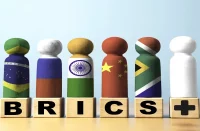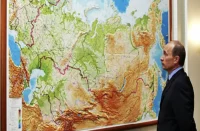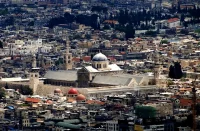Thomas Graham’s piece in National Interest places all the emphasis on what the US can do to harm Russia, but pays no heed at all to what Russia can do in kind. In short, Moscow, which is not at all isolated, can cement its existing relationships to create and lead a center of anti-establishment (i.e. Western global hegemony) gravity that challenges the West in a multivectoral fashion. The following ideas are prefixed on the belief that the West-Russia opposition has crossed the Rubicon into uncharted territory, and that Russia will use this momentum to try to fulfill its grand strategic objective of a non-Western-dominated world. In no particular order, some suggestions are as follows:
Take the Initiative: Instead of permanently being in a defensive position vis-à-vis NATO, Russia must take the initiative in building strategic partnerships (energy, economic, military, diplomatic, etc.) in states formerly thought of as being securely in the Western domain. It can start in Egypt, Bulgaria, Hungary, and Latin America, thereby applying the West’s policy of strategic encroachment into their own ‘backyard’. Wherever there are cracks in the Western-led international order, Russia should present itself as the attractive alternative, thereby wedging the gap even wider and weakening the entire Western structure.
Deepen Existing Bilateral Partnerships: Russia can deepen its strategic partnership with China and work on formalizing one with Iran, with the former being global and the latter being in the West’s most vulnerable theater. A Russian-Iranian strategic partnership would extend beyond Caspian and nuclear energy issues and see implicit cooperation between the two in the Mideast, especially in Syria, Iraq, and Yemen. It can even carry over into Afghanistan after the NATO drawdown by year’s end.
Expand Multilateral Activity: BRICS could be expanded to include the MINT countries, thus furthering the organization’s scope and creating opportunities for a long-term strategic ‘flip’ of those states from their largely Western orientations. The SCO is already enlarging with the forthcoming admission of India and
Pakistan, so this will present many more unforeseen advantages for Russia’s foreign and economic policies. Russia should support integrating its multilateral partnerships even further, as the interests of these organizations and their members largely coincide with Russian foreign policy.
Solidify New Trade Networks: The rush that non-Western countries were in to fill Russia’s counter-sanction agricultural void testifies to the interest that many states have in penetrating the Russian market. Moscow can use this, and every other counter-sanction, to help build an alternative non-Western-centric trade network that can bolster Russia’s complex economic interdependence with other states. This would give it the opportunity to expand mutual relations beyond the economic sphere and perhaps eventually associate these states into the multilateral webs of BRICS and the SCO.
Be the Bridge: Russia has the geostrategic opportunity of being an air, land, and sea bridge between Europe and East Asia. In line with China’s Silk Road and New Eurasian Land Bridge projects, the concept of the Northern Sea Route, and international air routes traversing Siberia, Russia can use its geographic position to reap the resultant dividends of East-West trade and thereby increasing its middleman importance. In the case of air travel, it can also prohibit American military overflight from Afghanistan and sanction Western air carriers.
Play the Devil’s Advocate: The EU is rife with both left- and right-leaning groups that preach a form of ‘Euroscepticism’ that endangers the current Atlanticist establishment. Whether or not they are explicitly Russian-friendly, their existence, such as that of the UKIP and the National Front, sends quivers down the Eurocrats’ spine. Moscow can use its information channels to provide implicit support for these movements and their supporters, thereby irking the West in the same manner that it does Moscow through its support of Navalny and others.
Conclusively, by following the above-mentioned policies, Russia would ironically be harkening back to the words that Emma Lazarus inscribed on the Statue of Liberty, albeit addressing the non-West and those within it who are dissatisfied with its global dominance:
“Give me your tired, your poor,
Your huddled masses yearning to breathe free,
The wretched refuse of your teeming shore.
Send these, the homeless, tempest-tossed, to me:
I lift my lamp beside the golden door!”
So for Western leaders, the question shouldn’t be “What can we do to Russia?”, but rather, “Will Russia lift the lamp?”














another brilliant piece from Andrew Korybko. But Andrew, will you please comment on this
http://globaleconomicanalysis.blogspot.com/2014/10/end-of-us-dollar-hegemony-not.html
which seems to be arguing — on what seem to be sound grounds — that Putin and the BRICs will fail?
Pingback: Will Russia “Lift the Lamp”? #WakeUp http://orientalreview.su/?p=8699 | Protestation
Pingback: Oh god it’s another one! | Russia Without BS